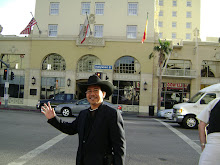Let me share you some questions which I hope you can help me answer. It's about our organizations and our leaders there, and what can be done to stop what needs to be stopped, ensuring the integrity of our professional practice.
1. A certain officer of an organization of some years ago, after the tenure of officership did not turn over funds to the organization's newly elected officers and subsequenty the officers years after. Then, the said certain officer decided unilaterally (on one's own, without the present group of officers' authorization) to withdraw the money for some purpose. What can be done to stop this? Is that said officer of a past leadership accountable to the present crop of officers and the organization's members? How should this accountability be enforced? Is there a name to this act?
2. How long should an outgoing officer of an organization need to turn over his/her position to the newly-elected officer? Should not turning over one's position and obligations be tolerated? Who is responsible to enforce this so that any outgoing officer does not keep "holding the bag" so to say, beyond one's tenure?
3. What if some members of the Board (not constituting a majority) decide to withdraw the organization's funds and the bank allows it (unfortunately), and consequently spends it without any accounting: is this a crime or not? What needs to be done to rectify if this were an error?
We are Counselors, yes, and will be members of an integrated professional association when we get our licenses. Our officers in the organization will have to be Counselors too, and one's conduct of the office in the organization needs to be beyond reproach lest Counseling be tainted and lose its integrity. As members, it is important as well that we hold our officers responsible. Election into office does not give license to the officers to commit crimes, nor should election keep one immune from such acts. In the event such happens, what must we as members do? Shall we only listen? Must these matters be included in our Code of Ethics as Counselors too?
We may really need to be aware of these realities, and do something lest those who commit such things continue to think they can do the same thing without qualms of conscience.
skip to main |
skip to sidebar


Home of IPCAP or Integrated Professional Counselors Association of the Philippines, (IPCAP) Inc, an organization of Registered and Licensed Guidance Counselors. This site offers some learnings and insights from my practice of Counseling Psychology here in the Philippines. I hope this can add into the growing literature in the field of Counseling Psychology, stirring the needed discussions and further learnings. I hope to add updates on developments in this particular field.
Contact Info.
Thank you for visiting this blog. For RGC's, to get the IPCAP Membership Application form, please email your request to berngu721@gmail.com. Or text to 0919-6236605 (for SMART subscribers), or 0927-3842739 (for GLOBE subscribers) or 0932-4459810 (for SUN subscribers: text me at Globe or Smart so I can open my Sun for you). You can be sure I'll email/text you back. Again, welcome. God bless
Looking For Counseling Centers?
Due to persistent requests for referral for Counseling services, herein is a list: (1) In Touch Community Services (Makati), Tel. # (02)893-1893; (2) Door of Hope Counseling Resource Center, Medical Plaza Makati 20th Floor Unit 2001
Amorsolo corner De la Rosa Sts., Legaspi Village, Makati City M.M., Tel. # (02) 750-8044.
For more description of their services, please click this
If you want to be listed, do email berngu721@gmail.com so your services can be included here.
All the best and God bless
Amorsolo corner De la Rosa Sts., Legaspi Village, Makati City M.M., Tel. # (02) 750-8044.
For more description of their services, please click this
If you want to be listed, do email berngu721@gmail.com so your services can be included here.
All the best and God bless
Inspirational Movies
Herein are some sites where movies are free to watch. Just click on the title and it will bring you a new window where the movie is shown. Enjoy this beautiful Inspirationals.
1. Simple Truths in Life
2. Who I am Makes a Difference
3. Daniel Goleman's "Why We aren't Compassionate All The Time?"
4. Life By Design
Life is good. Who you are indeed makes a difference. Pass it on. God bless and take care
1. Simple Truths in Life
2. Who I am Makes a Difference
3. Daniel Goleman's "Why We aren't Compassionate All The Time?"
4. Life By Design
Life is good. Who you are indeed makes a difference. Pass it on. God bless and take care
Followers
Blog Archive
-
▼
2008
(129)
-
▼
July
(16)
- Wanted: Counselor for College of St. Benilde
- Contact Addresses of Counseling-related Organizations
- IPCAP Certificates here: SEC & BIR Pics
- IPCAP Meeting at RGS, Cubao July 16, 2008 PICS
- IPCAP Meets at RGS
- IPCAP now SEC-registered!
- Suicide Potential Inventory for Filipinos
- PACERS Midyear 2008 Workshops Invitation Letter
- On Something to Think About & Act On
- Counseling Services Centers
- Philippine Journal of Counseling Psychology (PJCP)
- CALLING ON COUNSELING ORGANIZATIONS
- PACERS Midyear 2008 Workshops Descriptions
- Something To think About & Act On
- PACERS Midyear Workshops 2008 Some Details
- Counseling Services
-
▼
July
(16)
Visits Since Oct. 6, 2008
FEEDJIT Live Traffic Map
Links
- Clinical Counselor blog
- DepEd Endorsement for IPCAP 2nd National Convention
- DepEd Endorsement for IPCAP Cebu 2009
- FPCAP Website
- Google News
- Healing Eucharist Blog
- http://2006familyfeast.tripod.com
- http://fielsvd.tripod.com
- http://lambilos.blogspot.com/
- http://reflectscriptures.blogspot.com
- http://svdvocations.tripod.com
- http://www.geocities.com/pacersinc/index.html
- http://www.vanguardofcounsellors.org/home
- MAVEC Specialists Foundation
- PRC List for May 2009 Oath taking of new RGC's
About Me

- BRC
- Tacloban City, Leyte, Philippines
- I am Filipino SVD Religious Missionary Priest currently based in Catholic Trade Bldg, for this sabbatical leave. I used to be assigned in Christ the King Mission Seminary, Quezon City, Philippines. Am also a Ph.D. candidate in Counseling Psychology at DLSU, Manila. I used to do counseling and psychological work in the seminary, Sarnelli Center for Street Children at the National Shrine of Our Mother of Perpetual Help, Baclaran. I also used to teach Psychology subjects in the seminary. I used to accept counseling and psychological assessment for most clientele (child, adolescents, adults, religious & family). I just received my PRC License as a Professional Registered Guidance Counselor on Sept. 28, 2008.

